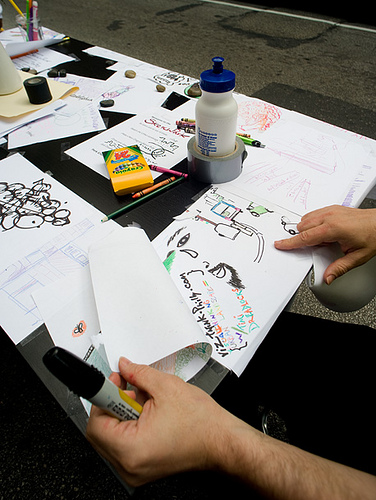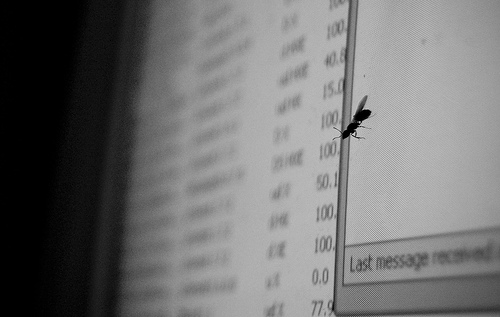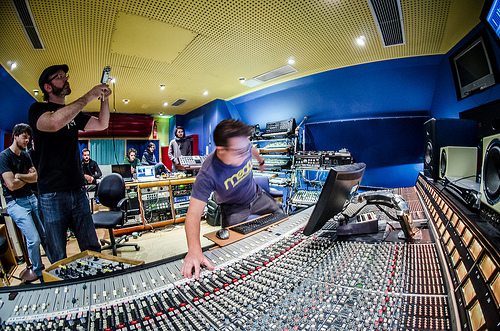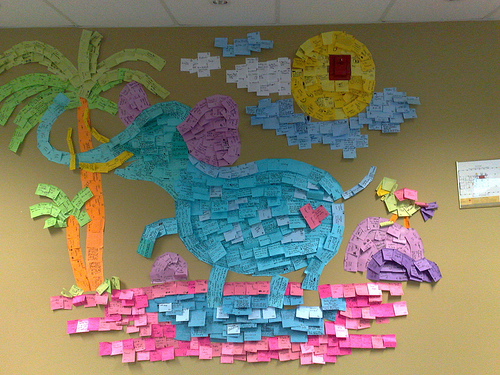All Careers in the Video Game Industry

If you love video games, it’s natural to be interested in video game careers. But if you’ve done even a little bit of research, you’ve probably noticed there are dozens of different job types in the video game industry. That can make your career research a bit overwhelming.
I have good news for you: Even though there are dozens of different game jobs, most of them fall into just six high-level job “families.” Simplify your research by reading about the job families below, then follow the links to dive deeper into the areas that seem to catch your interest. Learn about the top video game careers, explore what they do, and discover which ones you should consider for your future career.

Video Game Careers List
Below are the major career paths in the video game industry. Click to learn more about each job and what they do.
- Video Game Designer
- Video Game QA Tester
- Video Game Programmer
- Video Game Artist/Animator
- Video Game Audio Engineer
- Video Game Producer
- Video Game Writer
Video Game Designer
Related Jobs: Game Designer, Level Designer, Content Designer

More than any other job in the game industry, a Designer needs to have an incredibly deep and wide understanding of video games. You can only get that kind of insight by playing a ton of games, analyzing them, discussing them with other design-minded people and, eventually, by making your own games so you can learn through trial and error.
On a given day as a Designer, you’ll do things such as:
- Talk about and advocate for your design with producers, programmers, and artists
- Play competitors’ games to analyze and understand their strengths and shortcomings
- Write sections of game design documents (GDDs) to help explain your design to your team
- Design game levels and gameplay mechanics, tune and balance gameplay, make sure the game is fun
- Play the current version (build) of the game and make notes on how the design or implementation can be improved
- Work in software such as Microsoft Excel, XML editor, or custom tools, to create or tweak the numeric data that drives game play
Most studios break the design job down into separate areas like level design, mission/quest design, or overall game design. Larger games will break things down even further – a big team might have one or more designers dedicated to things like combat design, tuning and balancing, or pacing.
It can be challenging to start out as a designer unless you’ve already created some games, or have a degree or certificate from a game design school. Some designers start out as QA Testers or Production Assistants, and move into a design role once they prove that they have a talent for it.
If you’re the kind of person who loves to analyze games and truly understand what makes them a big hit or a big flop, then this is the job for you.
Learn More: Salary | Schools | Books | Requirements | Advice | Meet A Designer
Video Game QA Tester
Also called: QA Tester, Quality Assurance Tester, Black Box Tester

Milhan/flickr
Let’s start by busting a common myth: testers do not just “sit around and play games all day.” It’s real work! You’ll be playing games that are under construction, well before they’re finished. They’ll be buggy and missing content. At the early stages, they won’t even be “playable” in any real sense.
The tester’s main job is to play the latest under-construction version (“build”) of the game, and report anything that looks bad or doesn’t work right (a “defect”). That’s why it’s called quality assurance — you’re making sure the game is high-quality.
On a given day as a QA Tester, you’ll do things such as:
- Play the build, looking for defects
- When you find a defect, figure out how to make it happen predictably
- Type up an “issue report” — a description of the defect, along with steps to reproduce it — into special software called a “bug tracker” or “issue database”
- Submit the report to the game team so they can fix the problem
- The programmer that receives your report might ask for more information to help find and fix the issue
Some QA testers work with the game build only (called “black box” testers) while others may have some access to the source code and aid the developers with debugging (called “grey box” or “white box” testers depending on the level of source code visibility). The tester’s role is critical because they’re the last line of defense before the game is released to players. If they don’t do their jobs well, it leads to millions of disappointed fans as they realize the game has bugs, crashes, or — even worse — loses their progress. If you’ve had that happen, you know how frustrating it is.
 Starting your career as a QA Tester is one of the best ways to get into the video game industry, and it’s a great way to learn about how game studios work and how games are made. I know many people who started as testers and then went on to become producers, artists, designers, or programmers. In fact, I started my career as a tester and later went on to run a large game studio!
Starting your career as a QA Tester is one of the best ways to get into the video game industry, and it’s a great way to learn about how game studios work and how games are made. I know many people who started as testers and then went on to become producers, artists, designers, or programmers. In fact, I started my career as a tester and later went on to run a large game studio!
Learn how to become a game tester with my book, Land a Job as a Video Game Tester. You’ll learn the basics of game testing, and all the steps to apply, interview, and accept job offers. It’s got everything you need to know to get a job testing games.
If you have questions about becoming a QA tester, check out the how to become a video game tester FAQ.
Learn More: Salary | Schools | FAQ | Meet A Tester
Video Game Programmer
Also called: Coder, Engineer, Developer

Riebart/flickr
A video game programmer uses a programming language like C++, C#, or Java, to instruct the computer on how to take all of the art and other content and turn it into a working game.
Programming is by far the most technical job in the industry. Most programmers start by getting a degree in computer science, but if you’re a good self-starter then you may be able to learn on your own and try for an entry-level programming job at a game company. I know many successful programmers who do not have a computer science degree, but it’s a difficult way to start out. (You’d better hope you have a great game developer resume!)
On a given day as a video game programmer, you’ll do things such as:
- Read documentation or talk with the team about how a given game feature should work
- Plan your approach to coding the game feature by talking with other programmers, drawing diagrams, researching, etc.
- Use special software called an “integrated development environment” (IDE) to type your instructions as “source code”
- Run the game to test your source code and make sure it works as intended, and make changes/fixes if it didn’t work
- Receive bug reports from the QA testers, and attempt to fix the issues that they’ve discovered
- Implement game features, debug systems, optimize performance, and translate the players actions into game results
All but the smallest teams have several sub-specializations for programmers, focusing on well-defined areas of the code base such as the server code, combat, characters and AI, player input and movement, physics, graphics, or tools and pipeline.
The job of video game programmer requires deep technical know-how, focus, and patience. But if this job sounds right to you, then it can be extremely fun and rewarding. Also, programmers generally get the highest salaries in the game industry, so your hard work will definitely pay off.
Learn More: Salary | Schools | Resumes | Meet a Programmer
Video Game Artist / Animator
Related Jobs: Animator, Modeler, Concept Artist, UI Artist, Technical Artist

image:flikr/flickr
Art is one of the hardest game jobs to get into, because you need strong artistic talent. You also have to be good with various art tools that are used to create digital content, such as Autodesk Maya and Adobe Photoshop, and have assembled a great portfolio.
The good news is that there are many different kinds of art jobs in the video game industry, so if you’re not good at one then you can try another. Some of the jobs include:
- Environment Artist: Create the landscapes and building architectures of the game worlds
- Character Modeler: Create 3D models of the game’s characters and enemies
- Character Animator: Take the models from the Character Modeler, and create the animations that bring them to life
- Concept Artist: Envision and plan the look and feel of the game’s worlds and characters
- User Interface (UI) Artist: Design and draw the menus, heads-up display, and other navigational components of the game
There are many sub-specializations that any artist could spend an entire career working to master. Examples of specialized areas include concept art, character modeling, character rigging, animation, environments, and visual effects. Each art career has a different skills set, as well as a different salary range.
If you’re just starting out, you might know that you love doing art but aren’t sure which job is right for you. Going to an art school is a good way to try out different areas (and earn a degree while you’re at it!), but I also know many successful artists who are self-taught. If you’re more interested in the visuals of games instead of the technical aspects, then a career as an artist might be a great fit.
Learn More: Salary | Schools | Inspiration | Build A Portfolio | Meet an Artist
Video Game Audio Engineer
Related jobs: Sound Designer, Composer, Audio Implementer

dantaylorphotography/flickr
There are precious few audio jobs in the game industry, because just one audio engineer can often serve multiple teams. In fact, it’s common to have a single audio engineer covering an entire game studio. Many studios don’t have any full-time audio staff at all, instead choosing to contract on a temporary basis as needed.
On a given day as an Audio Engineer, you’ll do things such as:
- Talk with the game team to determine what sorts of music or sound effects are needed
- Search through commercial audio libraries to find sounds to use as source material
- Record new sound effects in a studio or out in the real world (“in the field”)
- Use specialized audio hardware and software to record sound effects, create new sounds, build immersive audio soundscapes, or modify and tweak combinations of sounds to make new ones
- Create and record sound effects, use fancy software to make otherworldly sounds, and build immersive audio soundscapes
- Use custom software and editors to integrate your sounds into the game
Under the “game audio” umbrella you’ll find a few specializations including music composer, Foley engineer, audio engineer generalist, and various jobs of programming/mixing/implementing audio in the game build.
Most of the audio jobs in the industry are contract positions. You can contract through a staffing agency, or as an employee of a contract audio firm. Most of the Audio Engineers that I’ve met are self-taught, although there are audio engineering schools that you can attend to get targeted training.
Learn More: Salary | Schools | Meet an Audio Engineer
Video Game Producer
Related jobs: Associate Producer, Production Assistant

zerojay/flickr
Every team needs a person who helps guide them and focus them, so they can concentrate on doing great work. For a game team, that person is the Producer. They’re responsible for the daily planning and management of the team. At some studios, they’re also responsible for shepherding the “vision” of the game.
On a given day as a Producer, you’ll do things such as:
- Meet with your game team to plan and schedule work to be done in the near future (usually the next 2 to 3 weeks, called a “sprint” or “milestone”)
- Check in with people on your team to make sure they aren’t stuck, and help them get whatever they need to be productive
- Talk with various people who are not on the team but have a stake in the project — studio directors, publishers, marketing department, etc.
- Maintain budgets, negotiate contracts, order food and supplies for the team
- Keep a long-term view, handle the biz, and keep the dev team focused and working together toward the goal
Entry-level producers may be called associate producers, and may be more focused on the daily tasks of scheduling than on the bigger picture. More senior producers often become “product owners” and are responsible for the long-term planning, and possibly even the finances, of the game project. Executive producers often oversee the development of multiple games at once.
To be a successful producer, you need to have great planning skills and be a good communicator. It helps a lot if you’re good with numbers, since you may be managing budgets and other expenses.
There are many ways to start your career as a producer. Producers often get their start as Game Testers, where they can learn all about making games before moving onto a team as an Associate Producer. Many game studios also have openings for associate producers or production assistants, which is another good way to get started.
Learn More: Schools | Meet a Producer
Video Game Writer
Related jobs: Narrative Writer, Narrative Designer
In the realm of game development, the quality of the narratives and characters can transform an “okay” game into something unforgettable. The Writer is responsible for weaving together these elements — crafting the stories, the dialogue, and the lore that bring a game world to life.
On a given day as a Game Writer, you’ll do things such as:
- Develop the game’s overarching narrative, including plot, character arcs, and world-building
- Write engaging dialogue for characters, and ensure their personalities and relationships come through well
- Work with game designers, artists, and programmers to weave the story into the gameplay
- Create in-game texts including lore entries, item descriptions, quest logs, — whatever is needed to deepen the game world and background
- Review and edit game scripts, checking for consistent tone, style, and quality from start to finish
Entry-level Video Game Writers might start as narrative assistants or junior writers, focusing on specific parts of the story, like side quests or character dialogue. More experienced writers could take on the role of Lead Writer or Narrative Designer. Those roles are responsible for overseeing the entire writing process, and making sure the game’s story matches the creative vision of the project.
To be a successful Game Writer, you’ll need to have strong writing skills, a vivid imagination, and a deep understanding of storytelling techniques. It’s also important to be familiar with game design principles, and have experience playing a wide variety of games. That will help you create engaging narratives that resonate with players.
There are several ways to start your career as a Video Game Writer. Some writers have a background in creative writing, screenwriting, or journalism. Others might have studied game design, or a related field. Many game writers also begin as freelancers, where they contributed to smaller projects, or have experience writing for game-related websites and publications.
It’s important for aspiring writers to build a portfolio of writing samples, do career networking, and seek internships or junior writing positions at game studios.
Learn More: Writing fan fiction | Learn game writing | Meet a Writer
Read my new book!
Making games for a living is an incredibly rewarding career, but it’s hard to break in unless you have insider knowledge. This book levels the playing field.


This is very helpful.
I am Working as an 3D Artist . MY Job is to do 3D Modeling with the help of 3d softwares like Autodesk Maya, Pixology Zbrush, and Photoshop. I have Skills to do BG-Sets Modeling , Character or Cartoon Modeling, Props or Vehicles Modeling. I got 5 years of Experience in Both Film and Games Industries. I have been Involved in 36 episodes (3years) Animation Tv series in RTM TV9 Channel Malaysia.My profession is 3D Modeling, Texturing, and Rigging based one the Pipeline Process of Animation industries.
That is excellent, Vibin. Thank you for sharing! 🙂
This article has helped me as to the different careers that are related to Game Design. Thank you very much for this post, Jason.
I’m glad it was helpful! Thanks for reading, Christopher.
Hello, Jason,
My name is William and i planned to become a video game programmer at Ubisoft Montreal and form me to get there i need to do 4 years of college (1 year for high math credits and 3 years for the computer science class) and then i need to go to McGill then go to the Ubisoft University Contest so then i could do a stage at the ubisoft studio and i liked your article it motivated me to push myself even harder to reach my dream.
Thank you of your time for reading this.
P.S: What made you want to write a book about the jobs of video game programmers?
Hi William, it’s great to hear that you have a goal and you’re working hard to achieve it! The reason I wrote a book about how to get into the game industry, is that thousands of people come to this blog for advice, but it’s hard to go into great depth on a blog. Books are sometimes a better medium for in-depth information.
Hi , my name is amber im a 22 year old mother of two. My whole family plus my family in law are all about games each one of us ( especially me ) all love playing video games! I would be honored to find bugs and help them make sure they are fixed i don’t have any problems writing reports as well ! It would feel great to be able to make sure everyone’s game experience is the best it can be and being able to do something i love for a once would change my life completely.
Hi Amber – Most game testing jobs don’t require any past experience testing games, so you can search for job openings and then apply! You can find job posting on the job search page (try searching for “game tester” or “game QA”). You can find even more by going to the Jobs page of game companies near you.
Hey Jason! Thank you for making this post! I was wondering, what type of UI or design jobs are there in the video game industry besides “Game design.” Are there any other subsets similar to UI?
Hi Renee, there are definitely full-time jobs for game artists who specialize in UI design for game menus, in-game HUD (heads-up display), and other 2D or “2D in 3D” game elements. Search for game jobs using keywords like “UI design”, “interaction design,” “UX design,” or “UI art.”
Hi jason my name is logan i am a proud father of 2 with a family and im 28 years old. I have always had a great passion in gaming and have been in search of a bigger career to better support my family. I have done labor work most my life but have become very technical as a HVAC technician now working in an office. Im a very open and fun loving person that has a lot of determination but lack any schooling or credible experience with the gaming world but yet an advanced player at home. Would like to know is it to late to pursue a career in the gaming industry? And if not where would i even start?
Hi Logan, since you’re starting “from scratch” with no game development skills (yet!), you’ll need to start learning some of those skills. A lot of people start by downloading some of the free game-making tools, which come with really good tutorials to teach you the basics. There are also other ways to get started, like taking some game dev courses, or trying for a job as a game tester. Check out my article on how to break into the game industry. You won’t learn it overnight, but the sooner you get started, the sooner you’ll develop those skills!
hey man, this helped me a lot for my assignment. i want to become a games designer and needed to find what they do on a daily basis. thanks for the information. 😀
Hi Jason,
I’m a young adult, and right now I’m taking an academic gap year. I’ve always dreamed of being a game designer, and over the past year I’ve become committed to make that dream a reality. Right now I’m looking for a job that I’m confident I can get upon graduating college and that pays enough to knock out my debt within a few years (my hope is to spend around $40k to $80k). There are jobs for which I’m sure I could build up the necessary amount of skill, but I’m not sure which one to pursue. I doubt that I could get a game design positioin right off the bat (although I’d certainly like to). I am artistically inclined, though, so I’m particularly interested in that field. I’m a fairly competent writer too, so I’m open to that field as well. I’m not technologically savvy, but I do plan on learning computer programming. So far it’s going well, so I’d be open to being a coder or QA tester as well. Sound design, however, does not spark my interest, and I’d be terrible in production. I’ve heard that positions like UI designers and technical artists are jobs that new grads usually don’t compete for. Could you tell me of any other jobs that are entry-level, low-competition, nonglamorous, and (relatively) well-paid? Thank you so much!!
Hi Alex! To directly answer your question, QA Tester is usually the fastest way to get in the door onto a development team. But I’d like to (gently and respectfully!) point out something I noticed in your comment: You mention a lot of planning/thinking, but you don’t mention taking any real action. To work in games, you have to start developing an actual skill set that will be valuable to employers. Whether it’s programming, art, or writing, you have to actually start doing some programming, art, or writing. Don’t wait. Start today, start right now. There’s a ton of advice on this site (use the Search box), but here’s a good place to start: Free Game Development Tools. If you feel resistance to starting right now, then take just the first step of downloading a tool and doing just one tutorial. It will be fun!
Thank you so much Jason!
Hi Jason..I am Manish from India..I am 26 year. My qualifications is bachelor in commerce and i am working in MNC as a senior associate. But I am not happy with job. I always think about different different games. I love to play video games and I also want this kind of job so is it possible I can also pursue something in gameing career? Please help
Hi Manish, yes, many people in the game industry switched from a different career. You might like this article on how to break into the game industry.
Hi Jason,
This is an awesome article and really helpful. Is QA the only way people consistently land producer jobs for game companies? I would love to work as a game producer and think I have a lot of the skills/traits that would make me a good fit for the job, but unfortunately I don’t have any experience as of now. Thanks!
Hi Frank, people come into game production from many different paths. QA is definitely the most common, but you can also come in through other paths that involve a mix of project management and team coordination outside the game industry. If you don’t have any experience managing projects and teams, then joining a game studio as a QA Tester is a great way to start learning the game development process and opening doors to other opportunities in the company.
Hi Jason,
I work with high school/middle school students. I just wanted to see if this information is still up to date to share with them? Quite a few are interested in working in the video game industry. Thanks for your response in advance!
Hi Jason (great name, BTW) – yes, this info is up to date! If your students have any questions that aren’t answered anywhere on my website, please use the “Contact” form to email me the questions and I’ll do my best to answer them for you!
Hi Jason,
I stumbled upon this website and I must say its a great article. I decided to get into game industry as a game writer only five months ago. Since I was starting from scratch I was completely lost. I didn’t know how to fill up my portfolio and what to do. I started to work on multiple game jams (at one moment I was working in 6 game jams at once). Not every jam was successful, but in one our game exceeded my expectations when after community voting it ended up on second place out of 53 submissions with a few comments prasing the story as well. Now I have around 10 jams behind me still looking for more and I’m a part of a smaller unofficial indie studio while still aming for a game writer position in one of the big game studios.
Peter, congrats on your growing success at the game jams! I know you mentioned that not every game was “successful,” but the real payoff is that you are learning and practicing your craft, and meeting people across the industry who might help you get a job later on. Not to mention it’s also fun. 😀 Thanks for stopping by and sharing your story.